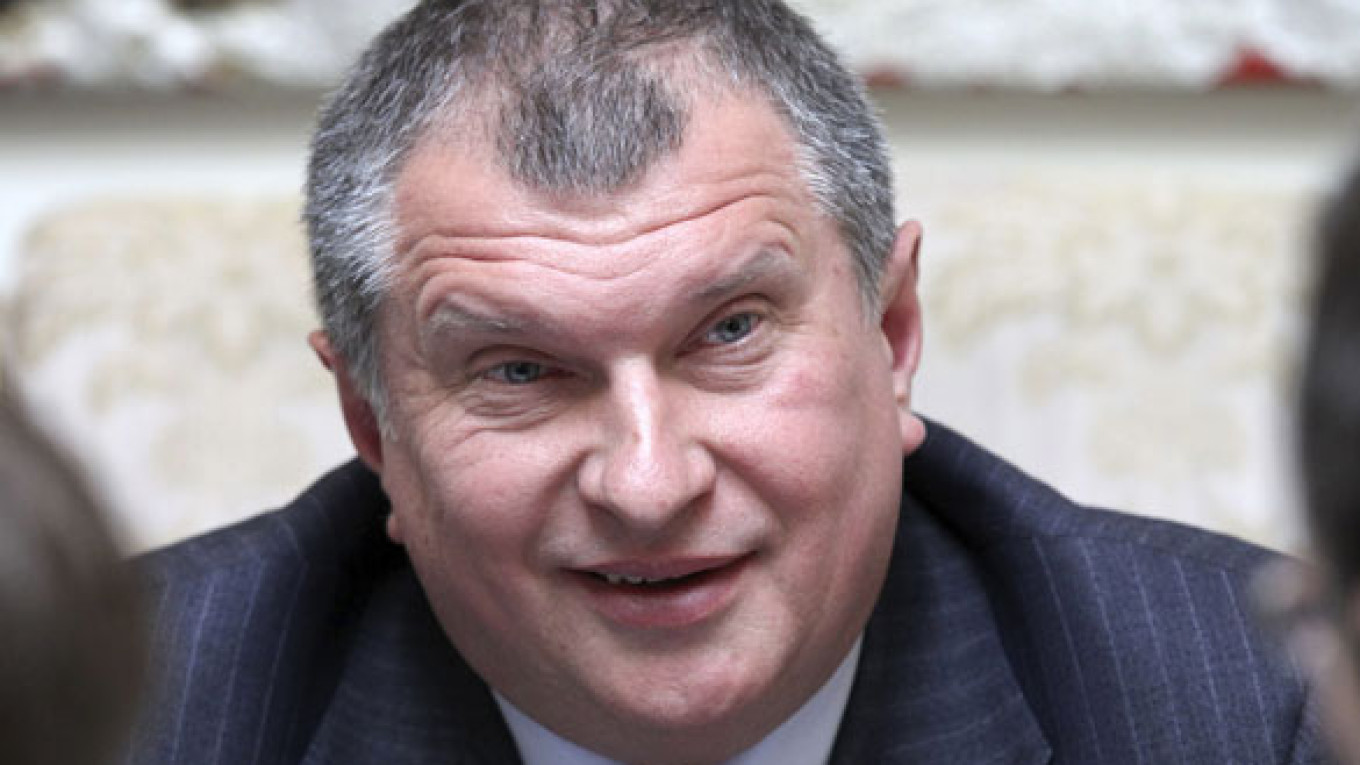ST. PETERSBURG — The tax discount on Rosneft’s crude exports from East Siberia will likely end at the start of next year, chopping off a thick slice of the state oil producer's would-be profit, Deputy Prime Minister Igor Sechin said Friday.
Chief executive Sergei Bogdanchikov, whose future in the post remained in doubt after Friday's annual shareholders meeting, said the change would not slow down investment in the region, where it operates its largest field, Vankor.
Rosneft, the world’s second-largest oil company by reserves after ExxonMobil, has gained the most from the current zero duty on exports from difficult new deposits in East Siberia. TNK-BP and Surgutneftegaz are also reaping benefits from the tax holiday, which the government may replace with a tax discount in July.
Sechin, who is also Rosneft's chairman, reiterated on Friday that companies would pay the full export duty once they are making a profit of at least 15 percent on their operations in the region.
“Rosneft will move over to that arrangement starting next year,” Sechin said in closing comments at the shareholders meeting.
Energy Minister Sergei Shmatko, speaking separately at the St. Petersburg International Economic Forum, also said the change was a possibility, although he put the threshold at 16 percent.
The profit per share at Rosneft, the country's biggest taxpayer, would drop by as much as 21 percent in that case, Deutsche Bank analyst Pavel Kushnir said in a note to investors.
Rosneft's shares closed up 0.7 percent in Moscow, slightly lagging the benchmark MICEX Index's gain of 0.9 percent.
Under the latest government proposal, the interim discounted duty would measure 45 percent of the regular duty and not apply to the portion of the oil price that is below $50 per barrel.
Bogdanchikov said Rosneft, which has sunk 247 billion rubles ($8 billion) into Vankor to date, would continue to invest to raise output, even if the higher duties kicked in. The company plans to spend $2.6 billion developing the jumbo field this year.
“I am sure the government will make investment an attractive decision,” Bogdanchikov told reporters on the sidelines of the general meeting. “We mustn’t lose the investment rhythm. If we cede some of the market, others will take over. Go try winning it back later.”
Rosneft expects Vankor’s output to account for an impressive 10 percent of its anticipated total of 118 million tons this year, he said.
Minority shareholder CNPC, China's largest oil and gas producer, asked a written question at the meeting about how the potential increase in the export duty would affect the price for East Siberian oil, which has been a hit in Asian markets.
Bogdanchikov replied only that there had been no decision yet on the increase.
Rosneft plans to invest 385 billion rubles ($12.4 billion) this year, including 184 billion rubles of its profit. The rest will come from such sources as a $15 billion loan from China that Rosneft is going to draw down this year. Rosneft, in return, agreed to long-term exports to China.
Bogdanchikov, whose contract as Rosneft CEO expires June 29, was elusive about his future at the company, as was Sechin. The meeting, where the state controls 85 percent of the vote, re-elected the entire board including Bogdanchikov and Sechin as its chairman.
The session of the new board, however, did not discuss the contract, an issue that is part of the board’s purview under changes approved by the company last year. Bogdanchikov appeared upbeat Friday, often beaming smiles when fielding questions from reporters.
Russian wire service reporters, trying to divert his attention from chatting with shareholders during a break in the meeting, kept saying they brought him good news from Sechin, who had said separately earlier that day that the government had not considered a replacement for Bogdanchikov.
“Are you sure it’s good news?” Bogdanchikov joked, when he was finally ready for questions.
Bogdanchikov has been Rosneft president since October 1998, and speculation about his future there has cropped up repeatedly in recent years.
In an unusual twist, Rosneft held its annual meeting outside Moscow for the first time. The move resulted in a smaller turnout, with just 205 shareholders registered for the event, compared with 875 last year.
Some of Rosneft's regular critics, however, made the trip to voice their concerns. One shareholder, Dmitry Udalov, asked whether independent directors on the board, who are appointed by the government, are genuinely independent. He noted that Rosneft was making a substantial deposit this year at the bank of one such independent director, VTB chief Andrei Kostin.
Company officials said there was no conflict of interest.
Bogdanchikov defended the meeting's location, saying the company wanted to get closer to its shareholders in and around St. Petersburg, who represent some 13 percent of the total. Moscow and the surrounding region is home to 20 percent of all shareholders.
“We are a mobile company,” he said at a news conference to a question from The Moscow Times. “What makes shareholders here worse than those in Moscow?”
A Message from The Moscow Times:
Dear readers,
We are facing unprecedented challenges. Russia's Prosecutor General's Office has designated The Moscow Times as an "undesirable" organization, criminalizing our work and putting our staff at risk of prosecution. This follows our earlier unjust labeling as a "foreign agent."
These actions are direct attempts to silence independent journalism in Russia. The authorities claim our work "discredits the decisions of the Russian leadership." We see things differently: we strive to provide accurate, unbiased reporting on Russia.
We, the journalists of The Moscow Times, refuse to be silenced. But to continue our work, we need your help.
Your support, no matter how small, makes a world of difference. If you can, please support us monthly starting from just $2. It's quick to set up, and every contribution makes a significant impact.
By supporting The Moscow Times, you're defending open, independent journalism in the face of repression. Thank you for standing with us.
Remind me later.


